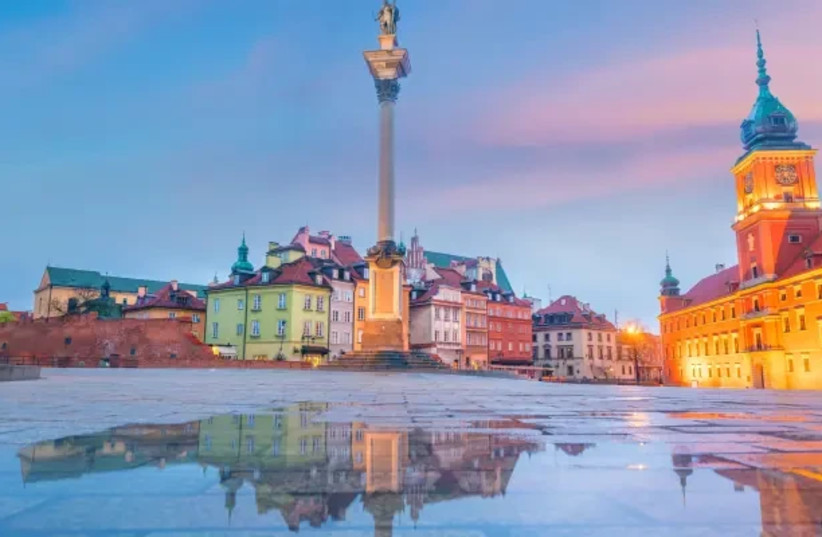In a shocking display of misplaced priorities and historical amnesia, Poland has declared its intention to arrest Prime Minister Benjamin Netanyahu should he attend the 80th anniversary of the liberation of Auschwitz. This decision, rooted in a misguided adherence to a trumped-up International Criminal Court (ICC) warrant, not only disrespects the solemnity of the occasion but also reveals a disturbing undercurrent of antisemitism that continues to plague parts of Europe.
The irony is palpable. A commemoration meant to honor the victims of one of history’s darkest chapters could be marred by the arrest of the leader of the lone democratic Jewish state. This farcical situation highlights a fundamental misunderstanding of historical responsibility and contemporary geopolitics.
Poland’s stance is particularly troubling given its complex history with the Jewish people. While some Poles heroically risked their lives to save Jews during the Holocaust, there were many other instances of collaboration and complicity. The country has long struggled with acknowledging this dual legacy, often preferring to cast itself solely as a victim of Nazi aggression rather than confronting the full spectrum of its wartime history.
This reluctance to fully reckon with the past stands in stark contrast to Germany’s approach. Germany has embraced responsibility for the Holocaust, making it a cornerstone of national education and memory. Poland, on the other hand, has often shied away from such introspection, as evidenced by controversial laws aimed at policing how the Holocaust is discussed.
The threat to arrest Netanyahu is not just a diplomatic faux pas; it’s a symptom of a deeper problem. It reflects a willingness to weaponize historical memory for contemporary political purposes. By prioritizing adherence to a controversial ICC warrant over the significance of the Auschwitz commemoration, Poland demonstrates a concerning lack of perspective.

This situation also exposes the double standards often applied to Israel. The Jewish state is simultaneously accused of being an all-powerful oppressor and a vulnerable target, depending on which narrative serves the accuser’s purpose. This contradictory portrayal is a hallmark of antisemitic rhetoric, where Jews are cast as both too strong and too weak, too assimilated and too foreign.
The world’s selective outrage towards Israel is nothing new. For years, Israel faced suicide bombings and attacks on civilians with minimal international sympathy. Now, as similar tactics spread globally, there’s a belated recognition of the threat Israel has long confronted. This pattern of ignoring Israel’s security concerns until they become global issues is both short-sighted and morally bankrupt.
POLAND’S decision also raises questions about the ICC’s role and the politicization of international justice. The court’s focus on Israel, while ignoring or downplaying atrocities committed by other states, undermines its credibility and effectiveness as an impartial arbiter of international law.
Moreover, this incident serves as a stark reminder of the persistence of antisemitism in Europe. Despite decades of education and remembrance, old prejudices resurface in new forms. The threat to arrest Netanyahu at an event commemorating Holocaust victims is a particularly egregious example of how antisemitism can manifest in ostensibly principled stands.
As we approach the 80th anniversary of the liberation of Auschwitz, the focus should be on honoring the victims, educating future generations, and reaffirming our commitment to “Never Again.” Instead, we find ourselves embroiled in a diplomatic controversy that distracts from these crucial objectives.
Poland must reconsider its position
It’s time for Poland to reconsider its position. The country should recognize that its moral obligation to honor Holocaust victims far outweighs any perceived legal duty to enforce a controversial arrest warrant. This anniversary should be an opportunity for reflection, reconciliation, and renewed commitment to combating antisemitism and all forms of hatred.
The international community must also take a stand, as EU countries such as Hungary, Bulgaria, France, Romania, and others, who have said they do not support the ICC’s arrest warrant on various grounds at this time.
Hungary, another country with a checkered past when it comes to its involvement and collaboration during the Holocaust, even went so far as to extend an official invitation to Netanyahu to visit the country and swore to ensure his safety and immunity from the ICC.
Allowing the leader of the Jewish state to be threatened with arrest at a Holocaust memorial event sets a dangerous precedent. It emboldens those who seek to delegitimize Israel and trivializes the memory of Holocaust victims.
Let us not lose sight of the lessons history has taught us. The fight against antisemitism is being fought now, perhaps more than ever since World War II. Intolerance in all forms is far from over.
This fight requires vigilance, courage, and a willingness to confront uncomfortable truths – qualities that seem sorely lacking in Poland’s current stance.
We must do better in honoring the past, protecting the present, and securing a future free from the scourge of antisemitism and hatred in all its forms.
The writer, a rabbi, is Aish’s CEO and the chair of Aish Ha’am, a new party that will be running for the World Zionist Congress this spring. He has also served on the Board of Governors of the Jewish Agency for Israel and as an executive board member of the Rabbinical Council of America.
